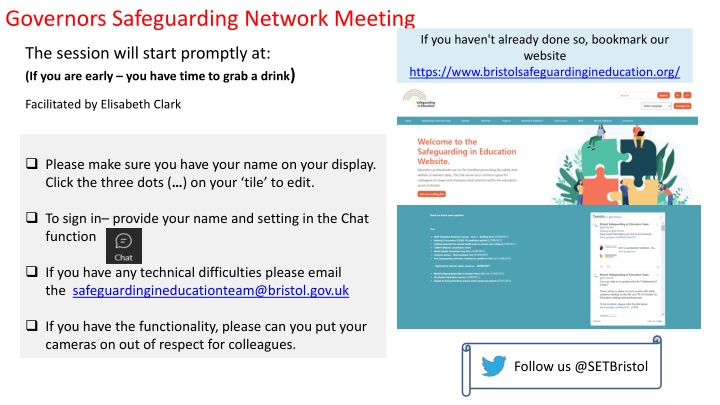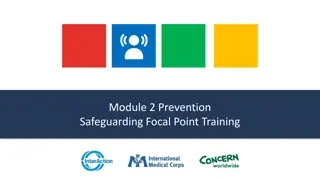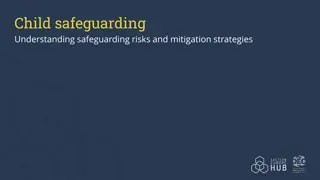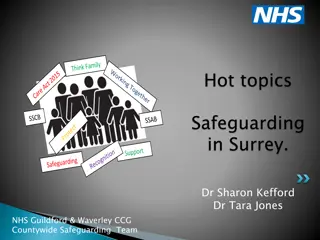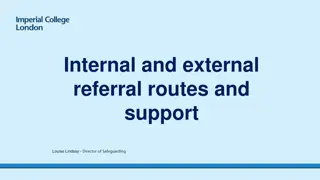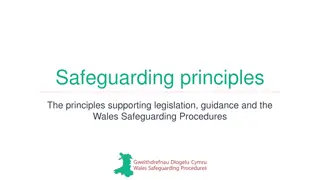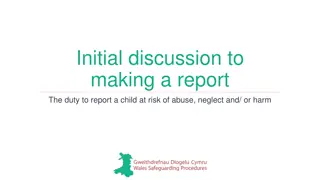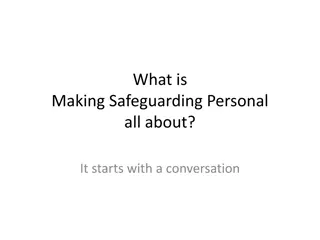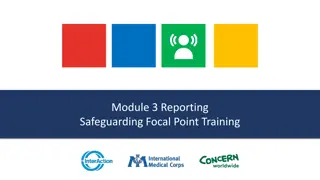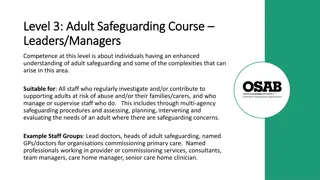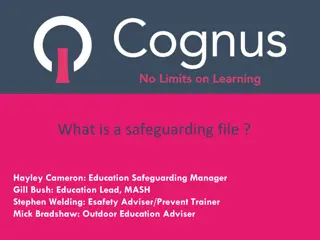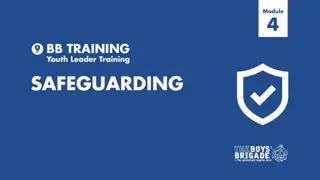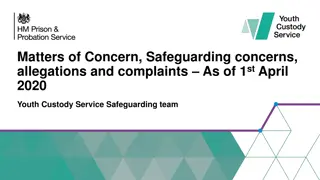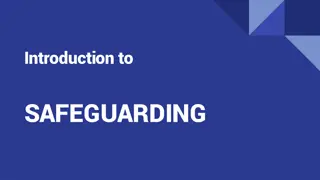Safeguarding Network Meeting highlights and resources
Stay updated on safeguarding news, triennial review analysis, trauma resources, child sexual abuse inquiry findings, and legislation updates. Engage with young carers support initiatives and discuss important topics like banning virginity testing and raising the minimum age for marriage. Access valuable tools and guides for promoting gender equality and addressing gender-based violence. Join the discussion to enhance safeguarding practices in education.
Download Presentation

Please find below an Image/Link to download the presentation.
The content on the website is provided AS IS for your information and personal use only. It may not be sold, licensed, or shared on other websites without obtaining consent from the author.If you encounter any issues during the download, it is possible that the publisher has removed the file from their server.
You are allowed to download the files provided on this website for personal or commercial use, subject to the condition that they are used lawfully. All files are the property of their respective owners.
The content on the website is provided AS IS for your information and personal use only. It may not be sold, licensed, or shared on other websites without obtaining consent from the author.
E N D
Presentation Transcript
Governors Safeguarding Network Meeting If you haven't already done so, bookmark our website https://www.bristolsafeguardingineducation.org/ The session will start promptly at: (If you are early you have time to grab a drink) Facilitated by Elisabeth Clark Please make sure you have your name on your display. Click the three dots ( ) on your tile to edit. To sign in provide your name and setting in the Chat function If you have any technical difficulties please email the safeguardingineducationteam@bristol.gov.uk If you have the functionality, please can you put your cameras on out of respect for colleagues. Follow us @SETBristol
Agenda Local & national news Triennial analysis of serious case reviews. Undertaking investigations CPD consultation AOB
Working with Children and Young People with trauma and PTSD - UK Trauma Council - free resources consisting of four animated videos and a set of seven training videos for mental health professionals on delivering the best- evidenced treatment for childhood PTSD. UKTC (uktraumacouncil.org) Independent Inquiry into Child Sexual Abuse - The Independent Inquiry into Child Sexual Abuse (IICSA) for England and Wales has published its final report. NSPCC Learning has published a CASPAR briefing summarising the report s findings and recommendations. The Report of the Independent Inquiry into Child Sexual Abuse | IICSA Independent Inquiry into Child Sexual Abuse NSPCC summary Independent Inquiry into Child Sexual Abuse (IICSA) final report One in 10 pupils in England have missed school because they felt unsafe - EDURIO & THE KEY - Poll shows pupils most likely to feel unsafe in corridors and playgrounds, with 13% saying it was because of a teacher. This can support formation of your pupil voice surveys read the full report here - Pupil Safeguarding Review | Young Carers and the school census Reminder! Complete the school census - Data items 2022 to 2023 - Guidance - GOV.UK (www.gov.uk) Reminder of local support from the Young Carers Service Designated Safeguarding Lead Networks - Term 1 2022-2023 (bristolsafeguardingineducation.org) Young Carers Action Day 2023 16 March - The theme for 2023 is Make Time for Young Carers. Young Carers Action Day 2023 | Carers Trust
Health and Care Bill: banning virginity testing - This fact sheet explains how the government plans to protect and safeguard vulnerable women and girls by banning the harmful practice of virginity testing in the United Kingdom. Health and Care Bill: banning virginity testing - GOV.UK (www.gov.uk) Implementation of the Marriage and Civil Partnership (Minimum Age) Act 2022 - The Act will raise the age of marriage and civil partnership to 18 in England and Wales to protect children from the scourge of forced marriage (including ceremonies of marriage which are not legally binding). Takes effect on Monday 27 February 2023. Implementation of the Marriage and Civil Partnership (Minimum Age) Act 2022 - GOV.UK (www.gov.uk) Why its important to talk about Tate Toolkit Bold Voices the guide helps you to deliver talks, workshops and peer mentor training to staff and secondary school students aged 11-18 to equip them with the skills to talk about and challenge gender inequality, gender-based violence and misogyny. How to respond to boys inspired by Andrew Tate | Tes
A free platform for anyone over the age of 13 that can be used to report across eight different types of harm Threats Impersonation Bullying & Harassment Self-harm or Suicide Online Abuse Violent Content Unwanted Sexual Advances Pornographic Content
LGBT History Month 2023 - February 1 - February 28 - LGBT History Month takes place for the whole of February each year. LGBT History Month is a whole month dedicated to promoting LGBT equality. February 2023 Children s Mental Health Week 2023 6 - 12 February - This year's Children s Mental Health Week is taking place on and the theme is Let s Connect. Children's Mental Health Week NO MORE week 2023 5-12 March - NO MORE Week is an annual campaign against domestic abuse and sexual violence that aims to rouse individuals, organisations, and communities to make a change.NO MORE Week - UK SAYS NO MORE March National Day Of Reflection 2023 - 23 March a day to come together to reflect on our collective loss and support those who ve been bereaved. National Day of Reflection | Marie Curie 2023 Family Safety Week 2023 - March 30 - April 3 - Family Safety Week is an annual week-long campaign from family safety charity RoSPA . - Family Safety Week - RoSPA DATES FOR THE DIARY
Continuing Professional Development Practice challenges regarding dealing with concerns about staff Tickets, Tue 28 Feb 2023 at 14:45 | Eventbrite - To increase confidence in dealing with low level and safeguarding concerns and allegations regarding colleagues Centre of expertise on child sexual abuse (CSA Centre) Spotting the signs and indicators of child sexual abuse and three dates on Speaking to children about child sexual abuse, from April to September 2023 and at times to suit all professions. Free webinar series - CSA Centre KCSIE webinar series Join the Department for Education and subject experts for a series of four 60-minute safeguarding webinars to support the statutory safeguarding guidance The webinars will focus on four important topics: Low level concerns; Monday, February 6, 2023 16:00 - 17:00 Single central record; Tuesday, February 7, 2023 16:00 - 17:00 Safeguarding partners; Wednesday, March 1, 2023 16:00 - 17:00 Sexting/online harms; Monday, March 6, 2023 16:00 - 17:00 The SWGfL Podcasts - Interface! | SWGfL Young people, online wellbeing, and developing healthier habits - Interface | Podfollow
Reducing Parental Conflict Vision (RPC) Our overall vision for Reducing Parental Conflict incorporated six elements: Awareness raising training for Bristol workforce Difference between Domestic Abuse and RPC is fully understood RPC becomes part of routine enquiry Practitioners feel fully supported and equipped with tools to carry out interventions Clear pathway of how to access interventions with consideration to language of engagement and support Support and advice is readily available to all parents/ carers via Family hubs 9
Practitioner e-learning modules BCC staff please complete here Module 4 Role of the supervisor - Manager / supervisor e- learning module Module 3 Working with parents in conflict Module 2 Recognising and supporting parents in parental conflict Module 1 Understanding Parental Conflict and its impacts on child outcomes https://sscb.safeguardingsomerset .org.uk/sscp- training/module1/story_html5.ht ml https://sscb.safeguardingsomerset .org.uk/sscp- training/module2/story_html5.ht ml https://sscb.safeguardingsomerset .org.uk/sscp- training/module3/story_html5.ht ml https://sscb.safeguardingsomerset. org.uk/sscp- training/module4/story_html5.html
Welcome to Michael New Business Coordinator Abi Gbago, Executive Director of Children and Education Reena Bhogal-Welsh Interim Director of Education and Skills. Safeguarding in Safeguarding in Education Team updates Education Team updates Bristol City Council Leadership changes: Think Family Education App For statutory school aged children replacing the vulnerable childrens list. Limited progress on the S. 175 Audit and Safeguarding in Education Data officers. ACTION - Please do ensure contacts are up to date in line with Working Together to Safeguard Children: Annual full survey. if you haven t completed or had substantive changes. Midyear contacts changes- if you have only had one or two changed. Early Years Contacts Update. / out-of-school setting
Child Protection Conferences https://www.bristolsafeguardingineducation.org/news/child- protection-conferences-during-the-school-holidays/ Ensure cover over Teacher Strike Days. Safeguarding in Education team can attend to ensure quorum. Your Headteacher/principal must make the request to the safeguardingineducationteam@bristol.gov.uk You must notify the social worker and the Child Protection Conference team that you are making a request to the team. You must notify the parent that you will be asking the Safeguarding in Education Team to attend and share a copy of your report. Provide the team with contact details of the parent and the report so we can introduce ourselves before the meeting.
Triennial Triennial analysis of analysis of serious serious case case reviews reviews
Statutory reviews Victoria Climbi Children Act 2004 Local Safeguarding partnerships Child Safeguarding Practice Reviews Keeping Children Safe in Education 2015 Working Together Children and Social Work Act 2017 Lord Laming Report 2003 Local Safeguarding Childrens Boards 2006 /2010/2013 2018 2020
Recognising and responding to neglect Key Learning Points: 1. Recognising and responding to neglect Understanding the child s daily life Children not in school Recognising the meaning of behaviour Perpetrators Targeting of children with disabilities/other vulnerabilities Supportive and Trusting relationships Information sharing and effective communities. Professional disagreements and escalations and concerns Normalisation of neglect in areas of high deprivation and poverty Neglect rarely occurs on its own. It is commonly accompanied by emotional or physical abuse, and it is often a factor in child sexual abuse or exploitation. Neglect can sometimes come to mask other forms of harm. Complex parental needs including chronic health conditions, drug or alcohol use, poor mental health, and learning disabilities were common aspects of family life in cases of children who experienced neglect. Assessment tools for neglect can be helpful, but these need to be used consistently across all sectors and services, including education, and by professionals who have been trained in their use. The use of neglect assessment tools is likely to be more effective when sector and service leaders work together to develop a local culture of collaborative working. 2. 3. 4. 5. 6. 7. 8.
Quality Assurance Consider reading Keeping Bristol Safe Neglect strategy Joint Targeted area inspection of the multi-agency response to abuse and neglect in Bristol City Council Ensure that at least one person in your setting has completed the Graded Care Profile 2 (GCP2) training. Multi-agency workforce- Monday 13th February 2023 - 9am- 12:30 (Book via normal KBSP booking form on main KBSP training page.) Education workforce only- Thursday 9thMarch 2023 - 9:00- 12:30 (Book via normal KBSP booking form on main KBSP training page.)
Understanding the childs daily life Key Learning Points: Practitioners should aim to develop a holistic sense of each child s lived experience; as well as engaging with the child directly, this means integrating information from different sources, including from other agencies. It is important that practitioners are supported to work holistically to view children s lives and experiences in the round and not exclusively through one lens. SCRs suggest that this is a risk in particular for children who have special educational needs and/or disabilities. Practitioners should not assume that challenging behaviour in a child with a learning disability is due to their underlying condition or parenting; it may be, but a holistic approach also means considering other potential causes. 1. Recognising and responding to neglect Understanding the child s daily life Children not in school Recognising the meaning of behaviour Perpetrators Targeting of children with disabilities/other vulnerabilities Supportive and Trusting relationships Information sharing and effective communities. Professional disagreements and escalations and concerns 2. 3. 4. 5. 6. 7. 8.
So what? How well do you know your neighbourhoods and communities? Knowing our communities page Ward data Bristol statistics. Heath profiles Consider which other services can or who may already work with the family. Local Bristol services to support safeguarding in education. (bristolsafeguardingineducation.org) Conduct a home visit! Staying Safe Home visits (bristolsafeguardingineducation.org)
TEAM AROUND THE SCHOOL TEAM AROUND THE SCHOOL TAS is a partnership between schools and Families In Focus to deliver early intervention, improve outcomes for children and empower families TAS service is delivered via virtual or face-to-face meetings where worries and strengths are explored, and next steps are discussed Organizing a meeting and completing the TAS form is designed to be quick, brief and easy If you are unsure if a certain situation requires a First Response referral or a TAS meeting. Email or call the Families In Focus locality advice line: North: TASNorth@bristol.gov.uk - 0117 3521499 South: TASSouth@bristol.gov.uk - 0117 903 7770 East Central: TASEastcentral@bristol.gov.uk - 0117 357 6460
Key Learning Points: Children not in school 1. Recognising and responding to neglect Understanding the child s daily life Children not in school Recognising the meaning of behaviour Perpetrators Targeting of children with disabilities/other vulnerabilities Supportive and Trusting relationships Information sharing and effective communities. Professional disagreements and escalations and concerns Irregular school attendance was one of a number of concerns that had led to the involvement of services, yet the children remained effectively hidden in plain sight . 2. 3. 4. Professionals curiosity and concern should always be aroused by children missing school and non-attendance at early education and other settings. Practitioners should also maintain a sense of curiosity about parental explanations. 5. There is no proven correlation between home education and safeguarding risk. Nevertheless, as some SCRs over the years have shown, parents can sometimes use home education as a means of reducing or avoiding professional contact and oversight. 6. 7. 8.
Quality Assurance Ofsted ILACS focused on children missing education and the safeguarding of EHE. Engage with local School Attendance support - Strategic support and resources for improving school attendance (bristolsafeguardingineducation.org) Elective Home Education understand the local processes and consider signposting to additional support. file (bristol.gov.uk)
Key Learning Points: Recognising the meaning of behaviour 1. Recognising and responding to neglect Understanding the child s daily life Children not in school Recognising the meaning of behaviour Perpetrators Targeting of children with disabilities/other vulnerabilities Supportive and Trusting relationships Information sharing and effective communities. Professional disagreements and escalations and concerns Practitioners should not rely only on verbal disclosure. Inappropriate sexualised behaviour should always be recognised as a red flag for possible sexual abuse and considered in a multi-agency forum. Practitioners should not wait for a verbal disclosure. Young people with learning disabilities are at greater risk of abuse and might only display their distress through their behaviour. Changes in behaviour may indicate current harm; When young people are known to have experienced early harm or are living in care, education and other practitioners may be tempted to assume that difficulties in adolescence are a consequence of early childhood trauma or subsequent placement moves. 2. 3. 4. 5. 6. 7. 8.
Local Guidance to Read Principles for Trauma informed practice Relationships and Belonging Approach (bristol.gov.uk) Quality Assurance Look at the Centre of Expertise on Child Sexual Abuse resources updated for education (Nov 22): Communicating with children: a guide for education Communicating with parents and carers: A guide for education professionals when there are concerns about sexual abuse or behaviour Safety Planning in Education: A guide for professionals supporting children following incidents of harmful sexual behaviour
Perpetrators targeting of children with disabilities/other vulnerabilities Key Learning Points: 1. Recognising and responding to neglect Understanding the child s daily life Children not in school Recognising the meaning of behaviour Perpetrators Targeting of children with disabilities/other vulnerabilities Supportive and Trusting relationships Information sharing and effective communities. Professional disagreements and escalations and concerns Schools, including special schools, and family support services may be particularly well placed to promote the Child Sex Offender Disclosure Scheme, or Sarah s Law , to vulnerable families. 2. 3. 4. 5. Local leaders should consider how the scheme can be better promoted to protect children and families. 6. 7. 8.
https://www.bristolsafeguardingineducation.o rg/networks/safeguarding-send-networks/ So what? Safeguarding SEND Networks These networks are for DSLs, Deputy DSLs/SLT, SENDCOs, and any colleagues with key inclusion/equality and safeguarding roles. Term 4 16th March 2023 - 08:45* - 10:30 Term 6 19th June 2023 - 08:45* - 10:30
Key Learning Points: Supportive and trusting relationships 1. Recognising and responding to neglect Understanding the child s daily life Children not in school Recognising the meaning of behaviour Perpetrators Targeting of children with disabilities/other vulnerabilities Supportive and Trusting relationships Information sharing and effective communities. Professional disagreements and escalations and concerns Supportive and trusting relationships are key to effective safeguarding. Service leaders should work together and make every effort not to allow resource pressures or commissioning restrictions to undermine opportunities for sustaining established and effective relationships. 2. 3. 4. 5. Seeing children alone can optimise the chances of children feeling safe enough to talk. Be sensitive to the possibility that children may want to talk. 6. Where there are safeguarding concerns, practitioners should not over-rely on verbal disclosure, nor on children s denials or minimisation. When children do talk about abuse and maltreatment, they must be listened to. 7. 8.
Quality Assurance Have all your vulnerable children have a named and identified safe adult that they can access? Develop your bank of resource to do direct work with children and young people Direct work with children and young people (bristolsafeguardingineducation.org) Contextual Safeguarding Resources - Assessments with Individual Children and Young People | Contextual Safeguarding
Information sharing and effective communication Key Learning Points: 1. Recognising and responding to neglect Understanding the child s daily life Children not in school Recognising the meaning of behaviour Perpetrators Targeting of children with disabilities/other vulnerabilities Supportive and Trusting relationships Information sharing and effective communities. Professional disagreements and escalations and concerns Information sharing is necessary but not sufficient for effective communication between professionals. 2. 3. 4. Practitioners should remain ever mindful of how other professionals may interpret any information they provide. Explain the significance of information to others outside their discipline. 5. 6. 7. What does this mean for the child? 8.
Quality Assurance Sign up to the Think Family Education App to find out who else maybe working with the family. Be aware this DOES NOT replace the Police Safeguarding Notifications. https://www.bristolsafeguardingineducatio n.org/news/think-family-education-app- sign-up/ Be mindful of professional jargon and acronyms.
Key Learning Points: Professional disagreements and escalation of concerns Discussion and respectful challenge is integral to collaborative working. 1. Recognising and responding to neglect Understanding the child s daily life Children not in school Recognising the meaning of behaviour Perpetrators Targeting of children with disabilities/other vulnerabilities Supportive and Trusting relationships Information sharing and effective communities. Professional disagreements and escalations and concerns 2. 3. 4. Staff should be supported to ask questions about the decisions or actions of others. 5. Escalation policies should be formalised. If disagreements are dealt with informally rather than through formal channels 6. 7. 8. Reframing escalation processes as resolving professional differences may help to make them more effective.
Quality Assurance Make sure you are aware of and can use the Keeping Bristol Safe Partnership Escalation of Professional Disagreements. Consider ensuring that proportionate escalation is made and able to happen in your organisation.
Network Time Network Time - - Breakout rooms 15 mins Breakout rooms 15 mins How do you respond to the themes? 1.In your professional opinion - there any areas of concern that you feel needs more attention? 2.Is there anything you think you would like additional support/resources with regard to the above to make meaningful differences? 3.Can you identify any other good/strong practice/resources around the themes identified above? If so can you share?
KCSIE Part 4 - Section 1 - Concerns that meet the harm test What does LADO stand for? Provides advice and guidance and is involved in the management and oversight of all allegations cases regarding people who work with children. 1. Behaved in a way that has harmed a child or may have harmed a child Local Authority Designated Officer 2. Possibly committed a criminal offence against or related to a child; or 3. Behaved towards a child or children in a way that indicates they may pose a risk of harm to children; or 4. Behaved in a way that indicates that they are unsuitable to work with children Check LADO referral form and guidance Inappropriate referrals lead to impact on LADO capacity and ability to focus resource.
Low level concerns - KCSIE Part 4 Section 2 Concerns that DON T meet the harm threshold. But may constitute a conduct/practice issue. Culture/leadership/effectiveness of system. Low level concerns policy - is it effective? Record keeping Should be recorded in writing, details of concern, action taken (inline with KCSIE) Wider cultural issues? Are you a learning organisation? a place where people continually expand their capacity to create the results they truly desire, where new and expansive patterns of thinking are nurtured, where collective aspiration is set free, and where people are continually learning to see the whole (reality) together. (Senge, 1992)
LADO actions 1. Discussion by DSL / Head with LADO. 2. Complete LADO referral form (within 1 day). May constitute a criminal offence Consideration for sit down strategy meeting. Consideration with DSL, regarding redeployment or suspension . Inform press office where appropriate. Social care assessment of child considered Potential s.17/ s.47 assessment 3. LADO will check own records and Social Care records. No social care or police investigation. Internal investigation may need to use an independent investigator. Use of schools disciplinary process.
Responding to low level concerns Useful resources for conducting investigations Step 1 Assess the nature of concern - fact finding (as soon as you hear about something happening, you are acting upon it to get a reflection of what has happened).Establish the concern and allegation e.g. what has happened? When did it happen? Who was present? Gather factual accounts Conducting a safeguarding investigation | Croner-i (croneri.co.uk) This article provides a clear and concise overview of the investigation process and things you may wish to consider. Step 2 After fact find consider next appropriate contact :- HR Advice - Progress conduct issues identified LADO if meets the harm threshold. These are options depending on the outcome of the fact find, if HARMS test not met: Conducting-workplace- investigations.pdf (acas.org.uk) This offers a more detailed version of the information contained in the above article. ACAS also have a variety of templates which may be of use Investigation plan and report templates | Acas Formal investigation under setting s HR policies and procedures i.e. Code of Practice for Investigations and Disciplinary Policy Management instruction conversation followed with a letter which stays on somebody s file which explains formal expectations for the employee No formal action Explore support/ training/ development
Outcomes of formal investigations LADO/Safeguarding (Part 4, Section 1, harm threshold met) 5 KCSIE outcomes substantiated, unsubstantiated, malicious, unfounded, false Send report to both LADO (safeguarding perspective) and HR (employment law perspective) Commissioning Manager in liaison with LADO and/ or HR discuss next steps e.g. Disciplinary Hearing/ recommendation for employee/ culture HR/ Conduct (Part 4, Section 2, low level concern) Investigation outcomes Upheld or not upheld? Commissioning Manager to consider if they agree with the recommendations of the report or not Commissioning Manager to discuss next steps with HR e.g. Disciplinary Hearing/ recommendations for employee/ culture.
Network Time Network Time - - Breakout rooms 10 mins Breakout rooms 10 mins What do you want? What are your worries? Any good resources you have already encountered?
